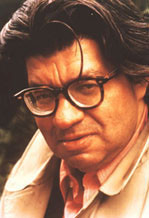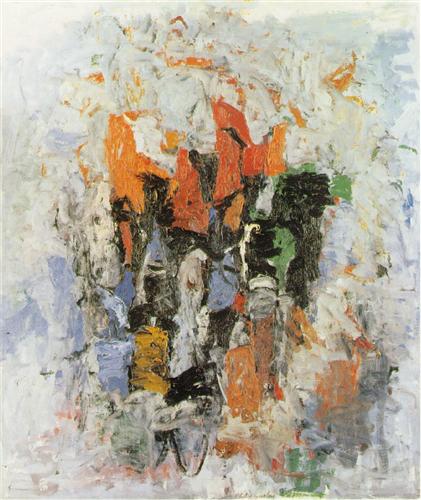January 12, 2015. Morton Feldman. Last week, as we celebrated Alexander Scriabin’s anniversary, we had to pass over several birthdays, like Nikolai Medtner’s and Francis Poulenc’s. This week is not as rich: many names but few first-rate talents. Ermanno Wolf-Ferrari, born on January 12th of 1876 was considered the best composer of comic operas of his time; now he’s practically forgotten. Another Italian, Niccolò Piccinni (born on January 16th of 1728), was also a very popular opera composer: he wrote for the Paris Opera and was considered Gluck’s equal. The only problem is that none of his works are staged these days; they’re just not very good. A Russian composer with a very French name, Cesar Cui, was also born this week, on January 18th of 1835. He’s the least interesting of the Mighty Five. Some of his songs are very nice but not much more is performed outside of Russia. The most significant composer of those born this week is the American Morton Feldman. The problem with him is different: in his mature years he wrote enormously long and sometimes difficult compositions and for that reason they are rarely performed.
Feldman was born on January 12th of 1926 in New York into a family of Russian-Jewish immigrants. As a child he studies piano and then composition; both of his teachers were followers of the New Viennese school of Schoenberg and Webern. When he was 24 Feldman met John Cage and they became fast friends; Feldman even moved into the same building where Cage lived. By then Cage, 14 years older than Feldman, was already well known in the avant-garde circles of New York. Cage introduced Feldman to a number of musicians and painters, such as Cage’s teacher the composer Henry Cowell, Virgil Thompson, George Antheil and Robert Rauschenberg. The 1950s were the golden age of Abstract Expressionism and Feldman became highly influenced by the art of Jackson Pollock, Mark Rothko and, especially, Philip Guston, who was then going through his abstract phase. Years later, in 1984, Feldman would write a four hour-long piece in memory of their friendship. Called For Philip Guston it’s scored for flute, percussion and piano. The painting “Clock,” on the right, was made by Guston around 1956-57. Of course there’s no clock in sight.
Feldman created a unique graphic system of music notation, within which many things were undetermined and left for performers to interpret. Sometimes it was the pitch, at other times the duration. Somehow, when you listen to his music, the results are always pure Feldman: sparse, whispering, exquisite, atonal but often lyrical, with a tremendous weight given to every sound (or silence), and often insanely long. In 1971 he wrote a piece called Rothko Chapel in memory of his friend Mark Rothko, who committed suicide a year earlier. The chapel, located in Houston, contains 14 large paintings by Rothko. You can listen to Feldman’s tribute to his friend here, it’s performed by members of the Seattle Modern Orchestra. The melody for the viola at the end of the piece was written by Feldman when he was 15. Rothko Chapel is a relatively short piece, it runs for about 24 minutes. Palais de Mari for the piano, written in 1986, was Feldman’s last piano work: he died of cancer on September 3rd, 1987. It’s performed here by Aki Takahashi, a Japanese pianist who premiered several of Feldman’s works. In her interpretation Palais de Mari runs for about 29 minutes.
Morton Feldman 2015
January 12, 2015. Morton Feldman. Last week, as we celebrated Alexander Scriabin’s anniversary, we had to pass over several birthdays, like Nikolai Medtner’s and Francis Poulenc’s. This week is not as rich: many names but few first-rate talents. Ermanno Wolf-Ferrari, born on January 12th of 1876 was considered the best composer of comic operas of his time; now he’s practically forgotten. Another Italian, Niccolò Piccinni (born on January 16th of 1728), was also a very popular opera composer: he wrote for the Paris Opera and was considered Gluck’s equal. The only problem is that none of his works are staged these days; they’re just not very good. A Russian composer with a very French name, Cesar Cui, was also born this week, on January 18th of 1835. He’s the least interesting of the Mighty Five. Some of his songs are very nice but not much more is performed outside of Russia. The most significant composer of those born this week is the American Morton Feldman. The problem with him is different: in his mature years he wrote enormously long and sometimes difficult compositions and for that reason they are rarely performed.
operas of his time; now he’s practically forgotten. Another Italian, Niccolò Piccinni (born on January 16th of 1728), was also a very popular opera composer: he wrote for the Paris Opera and was considered Gluck’s equal. The only problem is that none of his works are staged these days; they’re just not very good. A Russian composer with a very French name, Cesar Cui, was also born this week, on January 18th of 1835. He’s the least interesting of the Mighty Five. Some of his songs are very nice but not much more is performed outside of Russia. The most significant composer of those born this week is the American Morton Feldman. The problem with him is different: in his mature years he wrote enormously long and sometimes difficult compositions and for that reason they are rarely performed.
Feldman was born on January 12th of 1926 in New York into a family of Russian-Jewish immigrants. As a child he studies piano and then composition; both of his teachers were followers of the New Viennese school of Schoenberg and Webern. When he was 24 Feldman met John Cage and they became fast friends; Feldman even moved into the same building where Cage lived. By then Cage, 14 years older than Feldman, was already well known in the avant-garde circles of New York. Cage introduced Feldman to a number of musicians and painters, such as Cage’s teacher the composer Henry Cowell, Virgil Thompson, George Antheil and Robert Rauschenberg. The 1950s were the golden age of Abstract Expressionism and Feldman became highly influenced by the art of Jackson Pollock, Mark Rothko and, especially, Philip Guston, who was then going through his abstract phase. Years later, in 1984, Feldman would write a four hour-long piece in memory of their friendship. Called For Philip Guston it’s scored for flute, percussion and piano. The painting “Clock,” on the right, was made by Guston around 1956-57. Of course there’s no clock in sight.
friendship. Called For Philip Guston it’s scored for flute, percussion and piano. The painting “Clock,” on the right, was made by Guston around 1956-57. Of course there’s no clock in sight.
Feldman created a unique graphic system of music notation, within which many things were undetermined and left for performers to interpret. Sometimes it was the pitch, at other times the duration. Somehow, when you listen to his music, the results are always pure Feldman: sparse, whispering, exquisite, atonal but often lyrical, with a tremendous weight given to every sound (or silence), and often insanely long. In 1971 he wrote a piece called Rothko Chapel in memory of his friend Mark Rothko, who committed suicide a year earlier. The chapel, located in Houston, contains 14 large paintings by Rothko. You can listen to Feldman’s tribute to his friend here, it’s performed by members of the Seattle Modern Orchestra. The melody for the viola at the end of the piece was written by Feldman when he was 15. Rothko Chapel is a relatively short piece, it runs for about 24 minutes. Palais de Mari for the piano, written in 1986, was Feldman’s last piano work: he died of cancer on September 3rd, 1987. It’s performed here by Aki Takahashi, a Japanese pianist who premiered several of Feldman’s works. In her interpretation Palais de Mari runs for about 29 minutes.